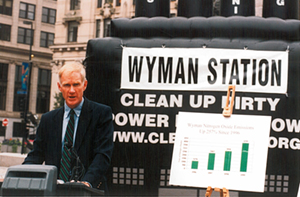NRCM news release Washington, D.C. – Today the Natural Resources Council of Maine (NRCM) filed suit in the federal Court of Appeals challenging the U.S. Environmental Protection Agency’s recent decision to remove power plants from the list of industrial pollution sources requiring strict controls for mercury and other toxic air pollutant emissions. “Merely declaring that Read More
Climate Change
Climate change and global warming pollution harm Maine people, wildlife, and our environment. Global warming, also known as climate change, is caused by a blanket of pollution that traps heat around the earth. This pollution comes from cars, factories, homes, and power plants that burn fossil fuels such as oil, coal, natural gas, and gasoline.
Climate-changing pollution knows no boundaries. It enters the atmosphere, spreads across the globe, and traps heat around the earth for 50-200 years after it is emitted. That is why we need to reduce global warming pollution now, because our children, and their children, will still feel the effects of global warming for years to come. Currently, the levels of carbon dioxide in the atmosphere are at their highest levels in hundreds of thousands of years.
Learn how you can reduce climate-changing pollution and advocate for a cleaner, healthier Maine.
NRCM Sues EPA Over Mercury Pollution
NRCM news release WASHINGTON D.C. — On April 28, state and national conservation groups sued the federal government to force the Environmental Protection Agency to require maximum achievable reductions in mercury and other toxic air pollutants emitted by coal and oil-fired power plants, as required by the Clean Air Act. The lawsuit against EPA was Read More
Maine’s Biggest Air Pollution Victory in 30 Years!
NRCM news release The Board of Environmental Protection on June 21, 2001, voted unanimously in support of a plan to clean up nitrogen oxide NOx air pollution at Wyman Station in Yarmouth – Maine’s largest single source of air pollution. Of particular importance, the plan does not allow Wyman Station’s owner, Florida Power & Light Read More
Chapter 145 Nox Control Program at Wyman Station
Statement by Brownie Carson to the Board of Environmental Protection Good afternoon. The Natural Resources Council has been grappling with the question of how to bring clean air to Maine for a long time. During my 17 years at the Council, we have participated as an intervener in many licensing proceedings, and we have commented Read More
Comment to the Board of Environmental Protection on Chapter 145 NOx Control Program
Comments by Sue Jones, Energy Project Director The Natural Resources Council of Maine appreciates DEP’s significant efforts in reviewing the comments submitted in the Chapter 145 rulemaking and in developing a proposal for your consideration today. With all due respect, however, the NRCM believes that DEP has not presented the best plan for the people Read More
More Than 1,000 Citizens Support BEP Move to Require Clean-up at Wyman Power Plant
PORTLAND AND BANGOR – Against a 25-foot-high inflatable power plant backdrop, Maine citizens held news conferences in Portland and Bangor to announce that they have collected and submitted 1,043 signatures, from residents of 230 Maine towns, to the Board of Environmental Protection (BEP) in support of the board’s preliminary vote to require Florida Power and Read More
Clean Up Wyman Station
Statement by Brownie Carson, NRCM Executive Director We are here today to announce that more than 1,000 Maine people from 230 towns support cleaning up the Wyman Station power plant – Maine’s largest single source of air pollution. These people come from nearly half the towns in Maine, and they are speaking out today for Read More
NOx Air Pollution Up 45% Between 1998 and ’99 at Wyman Power Plant
(AUGUSTA, Maine) Total emissions of the harmful pollutant nitrogen oxides (NOx) increased 45% – by an additional 1,302 tons – at the Wyman power plant outside of Portland between 1998 and 1999, according to figures released today by the Natural Resources Council of Maine. NOx emissions per unit of energy (Btu) generated, also increased. Florida Read More









